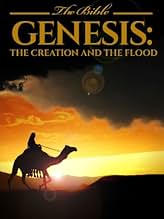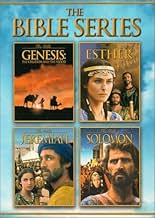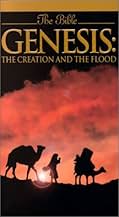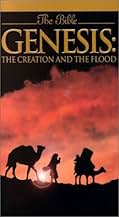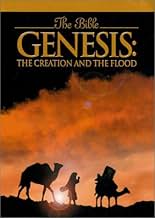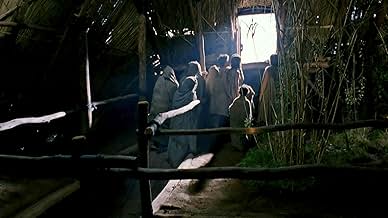Adicionar um enredo no seu idiomaAn all-enveloping darkness. Suddenly, a child's voice, frightened, questioning, pierces the darkness... The first flickering rays of light begin to sculpt mysterious shapes out of the darkne... Ler tudoAn all-enveloping darkness. Suddenly, a child's voice, frightened, questioning, pierces the darkness... The first flickering rays of light begin to sculpt mysterious shapes out of the darkness ... Among them, a very old man. He reassures the child, exhorting him to see the wonder... Ler tudoAn all-enveloping darkness. Suddenly, a child's voice, frightened, questioning, pierces the darkness... The first flickering rays of light begin to sculpt mysterious shapes out of the darkness ... Among them, a very old man. He reassures the child, exhorting him to see the wonders of the earth. And it is with this child's eyes that we will witness the creation of the ... Ler tudo
- Direção
- Roteirista
- Artistas
- Prêmios
- 1 indicação no total
Avaliações em destaque
As a Biblical adaptation, it has its work cut out. GENESIS lacks a single leading character so this film adopts a voice over (by Paul Scofield) to intone much of the story involving Adam and Eve, Cain and Abel, and Noah. It's all simple and straightforward, with admittedly powerful scenes (inserting modern-day conflict into one section is a genius idea) but it's also very slow and long-winded despite a running time of only an hour and a half.
The lack of a decent budget is also apparent - we never really see the flood despite the lengthy section telling Noah's story - but that doesn't really matter given the calibre of Ermanno Olmi's direction. This is a worthy adaptation, but not really a film you'd want to go back to.
It's a gorgeous meditation on the biblical story and the religious awe that inspired the book. It's an unusual film—a good thing, because it doesn't really follow any sort of formula. Instead, it builds up interest through the rather straightforward telling of the dawn of man, and it summons that spiritual part of us that can look at the flight of birds, hear the sound of rain, and listen to music, whereby we are transported to a higher realm than the one in which we live.
Many natural phenomena are used in this audio/video symphony. The look of wisdom and dignity on an old man's face and the words he speaks with such controlled mastery blend together and augment the constituent parts of the world as described by him, and causes us not to consider the science behind what's happening, but its grandeur. The scientist Richard Dawkins is a nice man. I like him. But it is at times like this, when I'm immersed in the spiritual rather than the scientific, that I genuinely feel sorry for him. It's wonderful to be able to appreciate the "science and reason" portion of our nature without discarding the spiritual part of it.
We humans are complex animals, and our thoughts and appetites run the gamut from the basest carnality to the most supremely ethereal. The two types of impulses are inherent to most of us—we are born with them: they are what make us fully human. Completely stifling either one seems just as unnatural as letting either run rampant.
That is the remarkable achievement contained within this film: the incredible control and dexterity, the decisions of the director over what to place in the film and what to leave out of it. There is the aspect of a symphony going on here. The images of primitive human conditions that combine in the mind and allows us to make that leap from the ordinary to the extraordinary—the same state of mind that allows us to hear a Beethoven composition and hear the sublimity without considering the natural world particulars of what frequency the notes are played at and the laws of physics behind tonality.
There really isn't a false step in the film. There are no sour notes, and nothing is out of key. Whoever had the ultimate decision-making power of what went into and what didn't make the cut in this film was someone cut from the same cloth as our ancestor who conceived of "In the beginning, the earth was without. . ." If anyone can identify with God it really shouldn't be doctors; instead it's really writers and especially filmmakers, the people who build worlds. Those who let light impose an image on celluloid and out of the darkness of the darkroom come forth a new world, limited only by their imagination and finesse. The Bible does say that we are made in the image of God, and as far as that goes, the director of this movie did a pretty good job of living up to that standard.
The film follows a nomadic family – a very nice one – at the dawn of man. Everyone should have a grandfather who is as good a storyteller as this man. The conditions are primitive but life is good for them, for this is a happy (and believable) family. There isn't much dialog between the characters, a good thing, because the intention of the filmmakers is to make a visual and aural experience; one in which they succeeded at beautifully.
Well, watch the movie yourself. If you understand where the people who made the movie are coming from you can judge the movie's merits based entirely upon that criteria. That's what I've done, and that's why I've given it ten out of ten stars.
For the purposes of enjoying this movie, don't worry about whether or not it's the God's honest truth. It doesn't have to be true. All you need in order to enjoy the film is to do what you do in any movie you watch—suspend your disbelief for the duration of the film. Kick back and enjoy a wonderfully uplifting experience.
Through a series of painterly images, and the calming, soothing narration of Omero Antonutti (Paul Scofield in the English version,) we are hand-led from the creation of man (in simple, elemental, but effective brush-strokes) to the fall of man, to what constitutes the longest segment of the film, Noah's construction of the ark, and the first of mankind's redemptions. Omero Antonutti plays the old man, the prophet-vessel of God himself as his boat is the vessel of a new humanity. The loading of the animals, the sense among Noah's extended family during the voyage that they are part of something greater than themselves, the dove at Ararat with the olive branch in its mouth, the vista of a subsiding ocean, all create, with the simplest of means, an impression that can be sublimely moving. And we ask ourselves why. What special gift can make a film director convert images, words, and sounds into the sacramental?
The music and musical selections by Ennio Morricone (with a great deal of Bulgarian women's chants incorporated) create a haunting impression as well. One does not have to be a great believer or even a believer at all, to be swayed by this work of wondrous poetry.
This film covers a period in the Bible that is difficult to dramatise. There are so many characters in bloodline between the creation of man and the birth of Noah that you can't pick a main protagonist. The film makers could have dealt with this in two ways:
OPTION 1 - Break this period down into three or four separate stories linked together by a narrator i.e 1)The Creation, 2) Adam & Eve 3)Cain & Able, 4) Noah
OPTION 2 - Use a narrator to read the Bible.
In this film they use a narrator to read the Bilble and it seems as if he is reading the Bible almost word for word. The "actors" rarely speak. I'm not even sure if they are actors as their faces rarely convey any emotion. The actors from the silent movie period such as Charlie Chaplin were able to convey emotions without speaking. The actors in this film however just move from one scene to another with blank faces whilst the narrator reads from the Bible.
I gave this film 1/10 because the score by Ennio Morricone was soothing. The score was the only redeeming factor.
Você sabia?
- CuriosidadesThe film had its world premiere on September 6, 1994, out of competition at the Venice Film Festival.
Principais escolhas
- How long is Genesis: The Creation and the Flood?Fornecido pela Alexa

